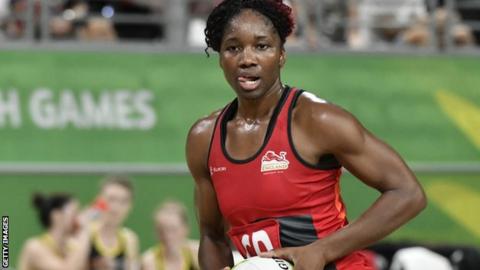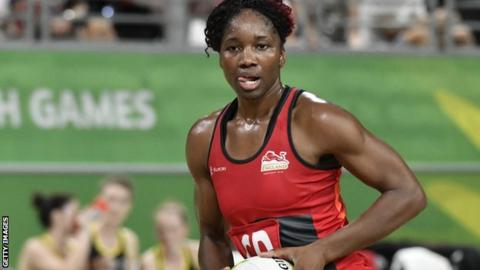
You want to reach the top of your sport, but you also want to start a family.
It’s a conundrum facing many sportswomen. Some British athletes, like Jessica Ennis-Hill and Jo Pavey, have become mothers and then come back to compete at the very top.
But for some, it’s a seemingly impossible situation.
As such, England netball captain Ama Agbeze has called upon sports’ governing bodies to introduce specific maternity policies to enable female athletes to feel “more comfortable” having children during their career.
Agbeze, 36, wants to start a family with her husband but told BBC Sport taking time out of her career would be a “significant decision”.
While she said it wasn’t “taboo”, she added that pregnancy was among “things that just don’t get mentioned”.
“If you’re forewarned, you’re forearmed,” she said.
“Hopefully they will start putting procedures and policies in place so that from as soon as you get into a squad, this is what would happen if you got pregnant, this is the support you would get, this is the notice you’d have to give, if you wanted to return you could, you might get a statutory maternity leave.
“I do think there is potential for change. There need to be policies in place so it is set in stone what happens in the eventuality that you get pregnant.”
UK Sport currently provides guidance to governing bodies which encourages them to manage pregnancies on a “case-by-case basis”.
England Netball is funded by Sport England but told BBC Sport it would “refer” to UK Sport’s guidance in the event of an athlete becoming pregnant.
- ‘I was devastated when I found out I was pregnant – am I the only one feeling this way?’
- Athletes can face ‘minefield’ returning after childbirth
What does current UK Sport guidance say?
If a female athlete becomes pregnant:
- She can continue to receive World Class Programme funding and support during pregnancy and after childbirth.
- She and her performance director are expected to agree an appropriate training and competition programme that would map the athlete’s return.
- Three months after childbirth, the sport’s performance director is encouraged to undertake a review with the athlete to assess their commitment to the agreed plan. They are not expected to have returned to full competitive level by this point.
- If, by the three-month review, the athlete has decided they no longer intend to return to the sport, they would be given a notice period, which would be dependent on the length of time they had been on the World Class Programme, before being removed from funding.
A UK Sport spokesperson told BBC Sport: “Our Athlete Performance Award framework enables an athlete to continue to receive support throughout their pregnancy and post-birth, and encourages the sport and individual athlete to mutually agree a time frame and training plan for their return.
“We have not heard significant concerns from athletes who are part of a UK Sport funded World Class Programme in relation to the support they have received throughout their pregnancy. However, we are currently working on the detail of our Future Strategy, and will continue to ensure we put athletes at the heart of everything we do.”
‘There’s only so much you can do with little funding’
In recent years, there have been high-profile examples of athletes returning from pregnancy and childbirth to compete at the top of their sport, including 23-time Grand Slam champion Serena Williams.
In terms of British athletes, London 2012 heptathlon Olympic champion Ennis-Hill had her son, Reggie, in 2014, but returned to win World Championship gold the following year before Olympic silver in 2016.
Similarly, British long-distance runner Pavey won the European 10,000m title 10 months after the birth of her second child before representing Team GB at her fifth Olympic Games in Rio.
However, Agbeze says it is different for athletes in team sports.
“They are from individual sports,” she said. “They only have to worry about themselves, and it’s completely different in a team environment.
“They will have had difficulty getting to training and dealing with childcare, but I think being in a team sport is different because you don’t set your training according to you.”
In recent years, netball’s governing bodies in Australia and New Zealand have introduced groundbreaking maternity policies, both of which provide “100% income protection” for up to two years.
In addition, Australian players are entitled to private health contributions of up to $1, 635 (£888) per year, while New Zealand’s players receive up to $1,500 (£771) per annum.
Netball Australia also allows children under 12 months to travel with their mother’s team, while they will also pay for a carer to travel too.
“As a player, especially having played in Australia and New Zealand and seeing how professional the game is, it’s frustrating to come back to England and see we’re not quite there yet,” Agbeze said.
“I know that England Netball are trying to do their best, but there is only so much they can do with little funding.”
Game over? It shouldn’t be
Former England international Tamsin Greenway gave birth to her daughter in 2013 and returned to international netball afterwards, but retired after the 2015 World Cup.
“It was tough,” she told BBC Sport. “There was no chance I could carry on.”
Greenway, 36, agreed that governing bodies should “start looking” at maternity provision, because female sports are “changing”.
“It should be a career you can come back to,” she said. “Lots of athletes have proven that, it doesn’t mean game over.
“I would like to think, bearing in mind we’ve got some of the best players in the world playing into their late 30s, surely it makes sense they can have a break to have kids and come back.”
Agbeze says she “doesn’t know” what would happen if she became pregnant during her international career.
“I’d be more comfortable knowing I could get support,” she said.
“I think it would take time for people to understand they can have a child and know they would be supported. It would take time for it to get into people’s psyche that it is possible, and I think eventually they would plan to have a child at a certain point if it worked for their career.”
In a statement, England Netball said: “We are committed to providing a safe and enjoyable environment for all who participate in netball, including those who are pregnant.
“Whilst the decision as to whether or not to participate rests solely with the relevant participant, the participant’s own health and the health of the unborn child are of paramount importance.
“In the event of the pregnancy of an international player, we would give advice and support on an individual athlete basis with guidance on continued exercise and participation in netball team training and match play alongside their antenatal healthcare provider (midwife and/or obstetrician).
“We also refer to the UK Sport guidance.”
Sport England’s head of equality and diversity, Cathy Hughes, said: “Women who wish to combine having children with a career should be supported to do so and that is no different for athletes.
“We would encourage all national governing bodies to look to UK Sport’s guidance and focus on how to support pregnant athletes, for example, working with the athlete to agree an appropriate training plan that works during and after pregnancy.”
- Mentor, Clarke & Dunn in World Cup squad
- England captain Agbeze ‘disappointed’ and ‘frustrated’ by World Cup omission
‘Our life is on hold’ – exploring other options
At 36, Agbeze is aware her biological clock is ticking and she and her husband, Fred, have started looking at other options.
She admits there have been times when she has calculated what tournaments and events she would miss if she got pregnant by a specific point, and feels pressure from others.
“Lots of people I meet me tell me I’m getting on and that I should probably start thinking of babies now,” she said.
“Some of my husband’s friends have played netball for Australia and New Zealand, and every time he sees them they’re like ‘you’re going to run out of time’, so then I become more conscious that I can’t have children forever.”
One of those other options is surrogacy. Agbeze’s husband, who lives in New Zealand, “desperately” wants them to start a family and they have explored surrogacy as a possibility.
“It’s very difficult for him because our life is on hold while I do what I do,” she said.
“I am really conscious of the fact he has made lots of sacrifices so that I can do what I do.
“Surrogacy is definitely a viable option. I like the concept but I’m still trying to come to terms with the fact that if I am capable of carrying a child, is it selfish of me to ask someone else to carry a child for me when there are people who can’t have children and have to go down that route.
“But I want to experience pregnancy, how my body changes and childbirth and see what it’s like for myself.”
[“source=bbc”]







